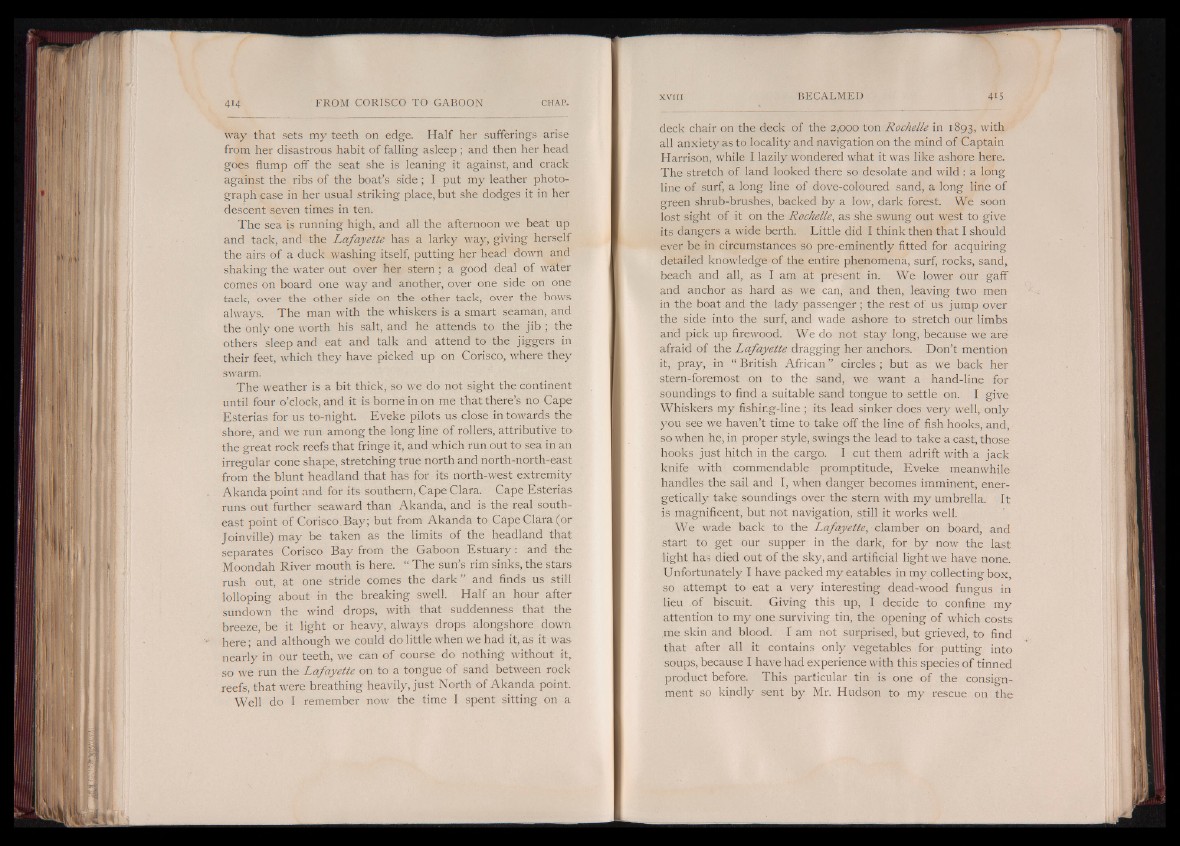
way that sets my teeth on edge. Half her sufferings arise
from her disastrous habit of falling asleep ; and then her head
goes flump off the seat she is leaning it against, and crack
against the ribs of the boat’s side; I put my leather photograph
case in her usual striking place, but she dodges it in her
descent seven times in ten.
The sea is running high, and all the afternoon we beat up
and tack, and the Lafayette has a larky way, giving herself
the airs of a duck washing itself, putting her head down and
shaking the water out over her stern ; a good deal of water
comes on board one way and another, over one side on one
tack, over the other side on the other tack, over the bows
always. The man with the whiskers is a smart seaman, and
the only one worth his salt, and he attends to the jib ; the
others sleep and eat and talk and attend to the jiggers in
their feet, which they have picked up on Corisco, where they
swarm.
The weather is a bit thick, so we do not sight the continent
until four o’clock, and it is borne in on me that there’s no Cape
Esterias for us to-night. Eveke pilots us close in towards the
shore, and we run among the long line of rollers, attributive to
the great rock reefs that fringe it, and which run out to sea in an
irregular cone shape, stretching true north and north-north-east
from the blunt headland that has for its north-west extremity
Akanda point and for its southern, Cape Clara. Cape Esterias
runs out further seaward than Akanda, and is the real southeast
point of Corisco. Bay; but from Akanda to Cape Clara (or
Joinville) may be taken as the limits of the headland that
separates Corisco Bay from the Gaboon Estuary: and the
Moondah River mouth is here. “ The sun’s rim sinks, the stars
rush out, at one stride comes the dark” and finds us still
lolloping about in the breaking swell. Half an hour after
sundown the wind drops, with that suddenness that the
breeze, be it light or heavy, always drops alongshore down
here; and although we could do little when we had it, as it was
nearly in our teeth, we can of course do nothing without it,
so we run the Lafayette on to a tongue of sand between rock
reefs, that were breathing heavily, just North of Akanda point.
Well do I remember now the time I spent sitting on a
deck chair on the deck of the 2,000 ton Rochelle in 1893, with
all anxiety as to locality and navigation on the mind of Captain
Harrison, while I lazily wondered what it was like ashore here.
The stretch of land looked there so desolate and wild : a long
line of surf, a long line of dove-coloured sand, a long line of
green shrub-brushes, backed by a low, dark forest. We soon
lost sight of it on the Rochelle, as she swung out west to give
its dangers a wide berth. Little did I think then that I should
ever be in circumstances so pre-eminently fitted for acquiring
detailed knowledge of the entire phenomena, surf, rocks, sand,
beach and all, as I am at present in. We lower our gaff
and anchor as hard as we can, and then, leaving two men
in the boat and the lady passenger; the rest of us jump over
the side into the surf, and wade ashore to stretch our limbs
and pick up firewood. We do not stay long, because we aré
afraid of the Lafayette dragging her anchors. Don’t mention
it, pray, in “ British African ” circles; but as we back her
stern-foremost on to the sand, we want a hand-line for
soundings to find a suitable sand tongue to settle on. I give
Whiskers my fishing-line ; its lead sinker does very well, only
you see we haven’t time to take off the line of fish hooks, and,
so when he, in proper style, swings the lead to take a cast, those
hooks just hitch in the cargo. I cut them adrift with a jack
knife with commendable promptitude, Eveke meanwhile
handles the sail and I, when danger becomes imminent, energetically
take soundings over the stern with my umbrella. It
is magnificent, but not navigation, still it works well.
We wade back to the Lafayette, clamber on board, and
start to get our supper in the dark, for by now the last
light has died out of the sky, and artificial light we have none.
Unfortunately I have packed my eatables in my collecting box,
so attempt to eat a very interesting dead-wood fungus in
lieu of biscuit. Giving this up, I decide to confine my
attention to my one surviving tin, the opening of which costs
me skin and blood. I am not surprised, but grieved, to find
that after all it contains only vegetables for putting into
soups, because I have had experience with this species of tinned
product before. This particular tin is one of the consignment
so kindly sent by Mr. Hudson to my rescue on the